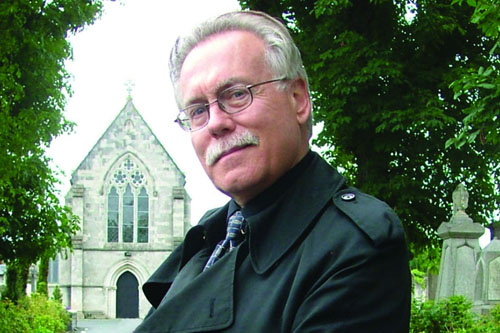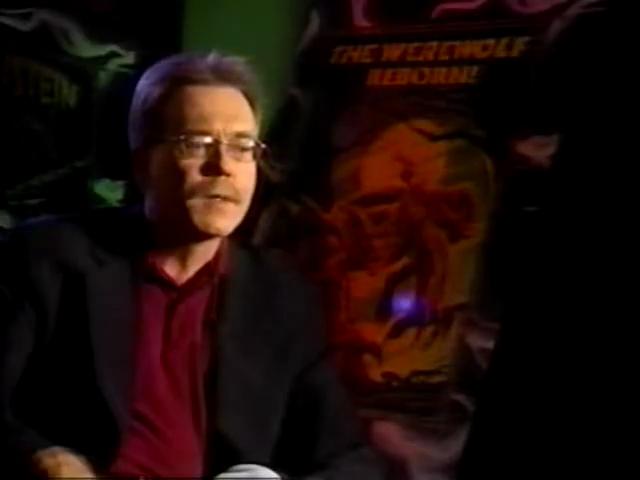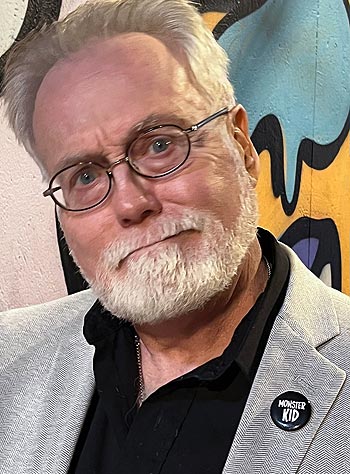 The January 1, 2024 demise of David John Skal, whose car was struck by a drunk driver in Glendale, CA, started off 2024 on a tragic note. Skal, for those who don’t know, was one of the most knowledgeable commentators in the horror field, and a writer who exerted a not-inconsiderable influence on yours-truly.
The January 1, 2024 demise of David John Skal, whose car was struck by a drunk driver in Glendale, CA, started off 2024 on a tragic note. Skal, for those who don’t know, was one of the most knowledgeable commentators in the horror field, and a writer who exerted a not-inconsiderable influence on yours-truly.
The Ohio born, California based Skal learned his craft at Ohio University, where he majored in journalism. Beginning in 1990 with HOLLYWOOD GOTHIC: THE TANGLED WEB OF DRACULA FROM NOVEL TO STAGE TO SCREEN, a breakthrough study that immediately became (in the words of USA TODAY’s David Colton) “one of the field’s essential reads,” Skal turned out many scrupulously researched and elegantly drafted “cultural histories.”
THE MONSTER SHOW (1993), my personal favorite of those histories, offered a highly quirky overview of 20th Century horror, while ROMANCING THE VAMPIRE (2009) provided a lively history of vampire lore from its earliest incarnations to DRACULA and its innumerable offspring, and DEATH MAKES A HOLIDAY (2002) a scrupulous take on Halloween lore. Skal also co-authored (with Elias Savada) DARK CARNIVAL (1995), the definitive biography of FREAKS director Tod Browning.
But we mustn’t forget (as many others seem to have done) that Skal was also a highly skilled novelist. He was, in fact, a master of the form, having essentially invented a cyber-horror format that was entirely his own.
In the latter category were three novels that never received the attention they deserved. At issue is the fact that the first two were issued as paperback originals, and the third under the “ISAAC ASIMOV PRESENTS” banner, which appears to have greatly upset fans of the more traditional brand of Asimov-inflected sci-fi. Nonetheless, all three books impacted this reader greatly, and the late author/critic Edward Bryant was also quite enamored with Skal’s novels, having provided enthusiastic blurbs for each.
SCAVENGERS (1980) was a hallucinatory look at a future world where “mind sharing” is all the rage, while ANTIBODIES (1988) provided what is very likely the last word in cybernetic psychosis, and an excursion in late Twentieth Century bizarrie that to these eyes ranks with classics of the form like THE WASP FACTORY and HELL HOUND. Sandwiched between those triumphs was WHEN WE WERE GOOD (1981), a dystopian downer that isn’t as strong as either, but showcased a writing talent that even at medium strength was well ahead of the curve.
Skal may have abandoned fiction, but the imaginative impulse never quite deserted him. Note the more outré passages of THE MONSTER SHOW, including “The accumulated weight of birth-related horror imagery amounts to an undeclared war between the living and the unborn” and “The unborn had merged with the undead, and the villagers gathered in a frightened dream to offer their babies in bags at the foot of Dracula’s castle.” Skal was taken to task for such passages by critics, one of whom dubbed Skal’s novelistic projections “pretty far-fetched,” and another as “pretentious and semi-literate drivel.” I’d argue, however, that Skal’s fictional orientation was primarily responsible for the uniqueness of his historical commentary; scholarly he may not have been (a point in his favor, FYI), but literate and inventive he most definitely was.
Also worthy of mention are Skal’s DVD/Blu-ray commentaries and documentaries, which were every bit as erudite and authoritative as I’d expect. I’m particularly fond of his commentary track for FRANKENSTEIN (1931), which very nearly made me revise my views on a film I’ve always found overrated, and FREAKS, which reinforced my enthusiastic view of that 1932 classic, as well as his authoritative docos SHE’S ALIVE, about THE BRIDE OF FRANKENSTEIN (and included on that film’s DVD and Blu-ray releases), and MUMMY DEAREST, about THE MUMMY (and found on the MUMMY DVD).
I can’t help but lament the David J. Skal endeavors we’ll be denied. A “cultural history” of FRANKENSTEIN in the mold of his DRACULA analysis would have been welcome, as would a biography of that film’s director James Whale (who Skal knew more about than nearly anyone else) and the publication of Skal’s 1980s-era manuscript EAT ME, described by Bryant as “a novel about anorexia that eats THINNER for breakfast.” Thankfully, though, the media he left behind more than stands on its own, showcasing an imaginative range and grasp of historical minutiae that remain unrivalled.


